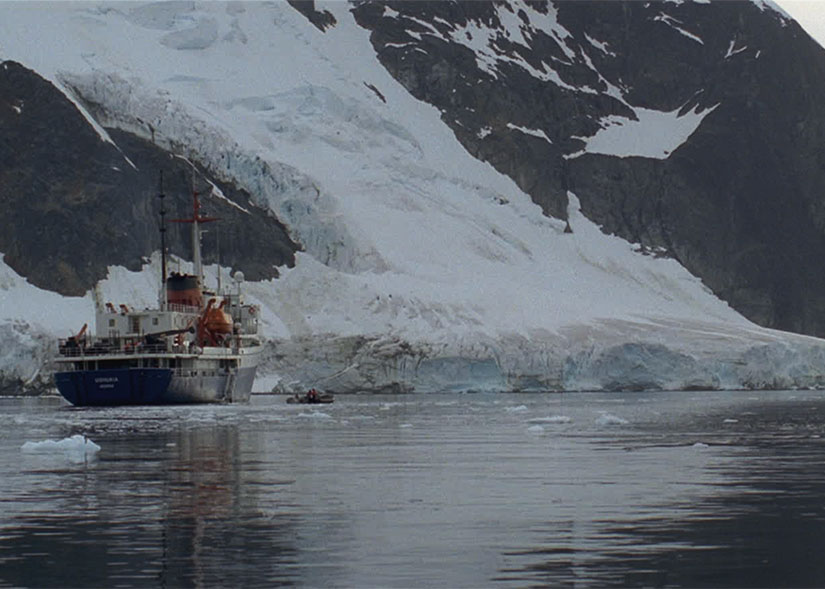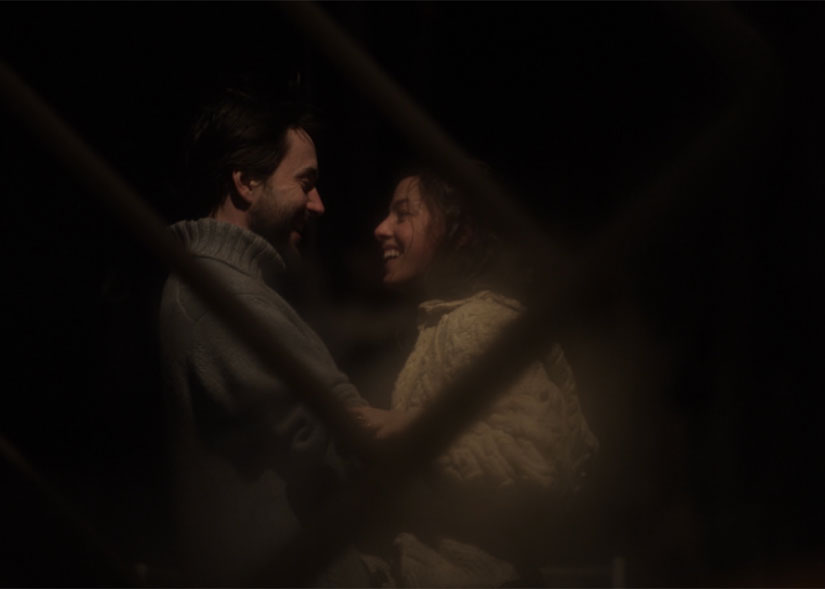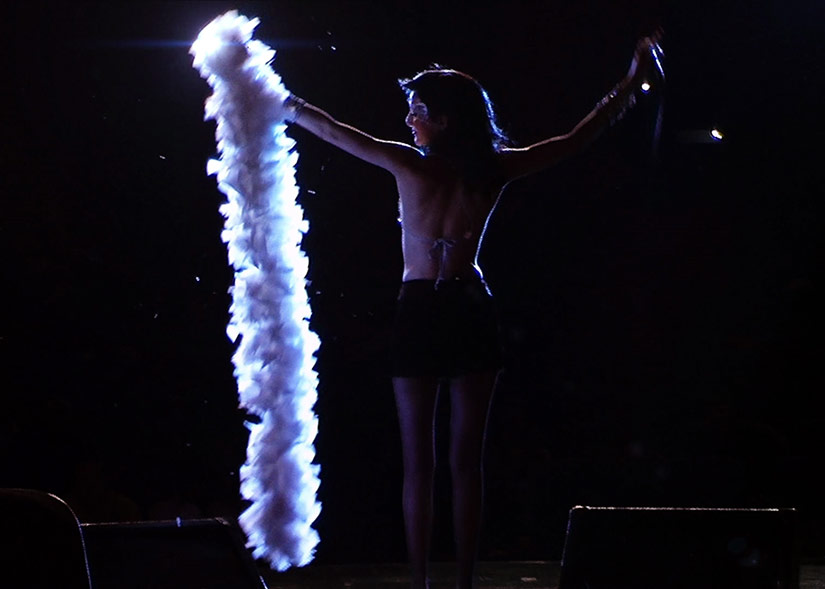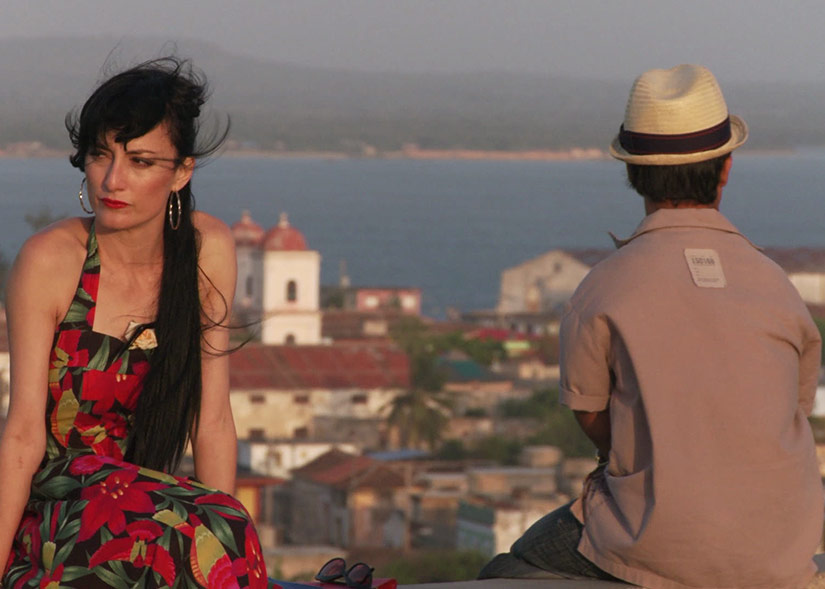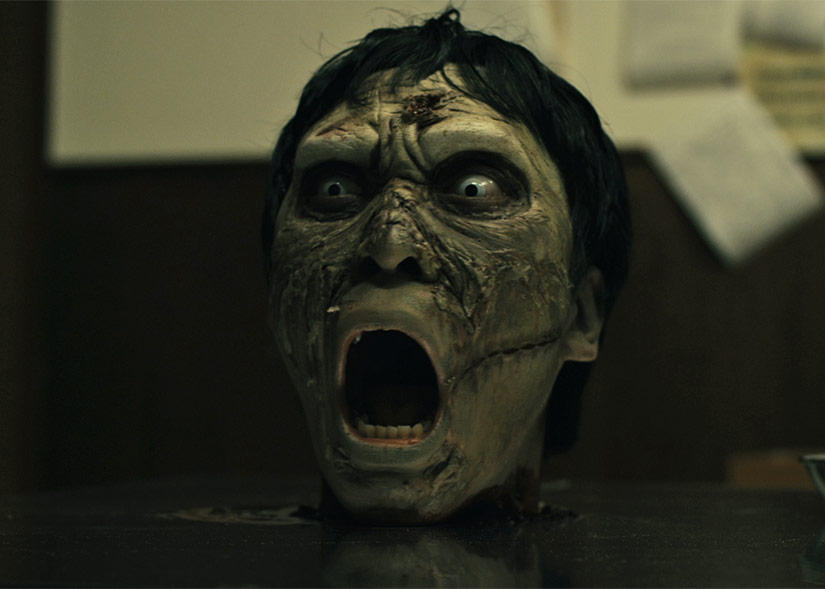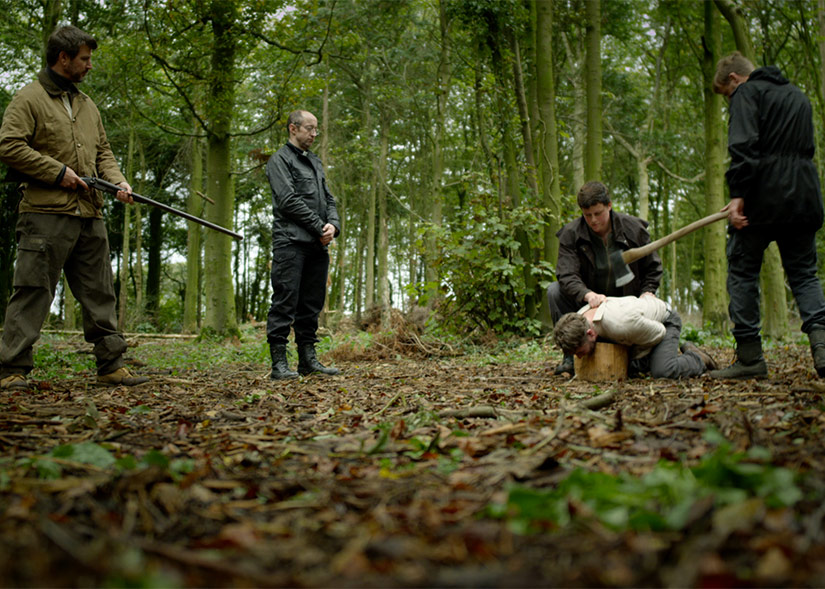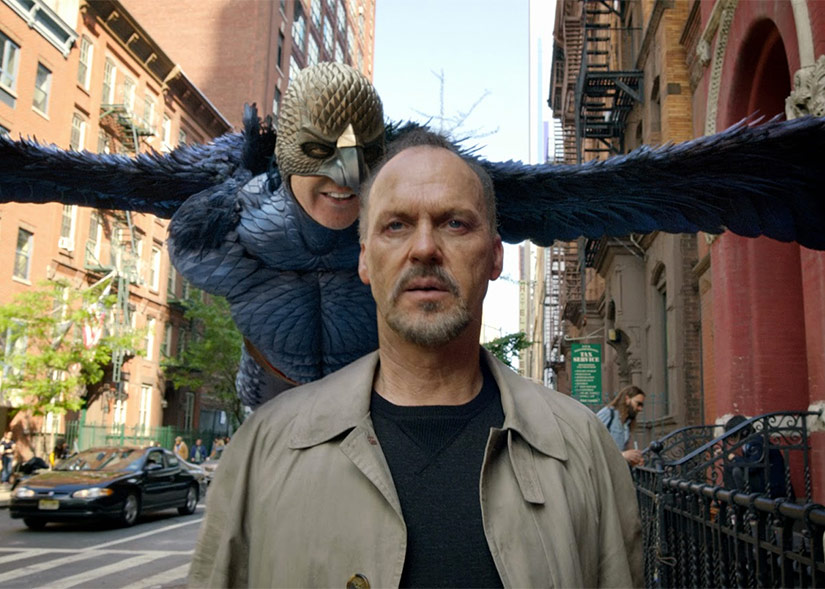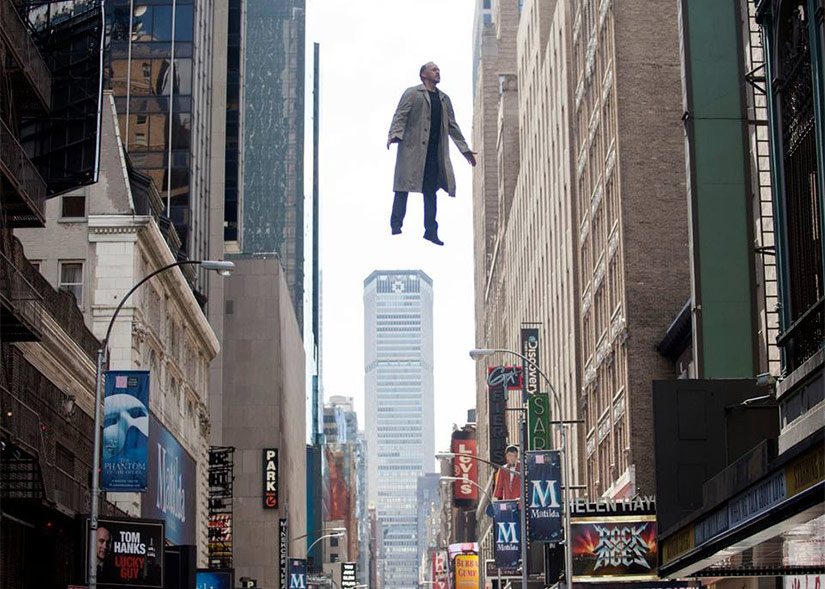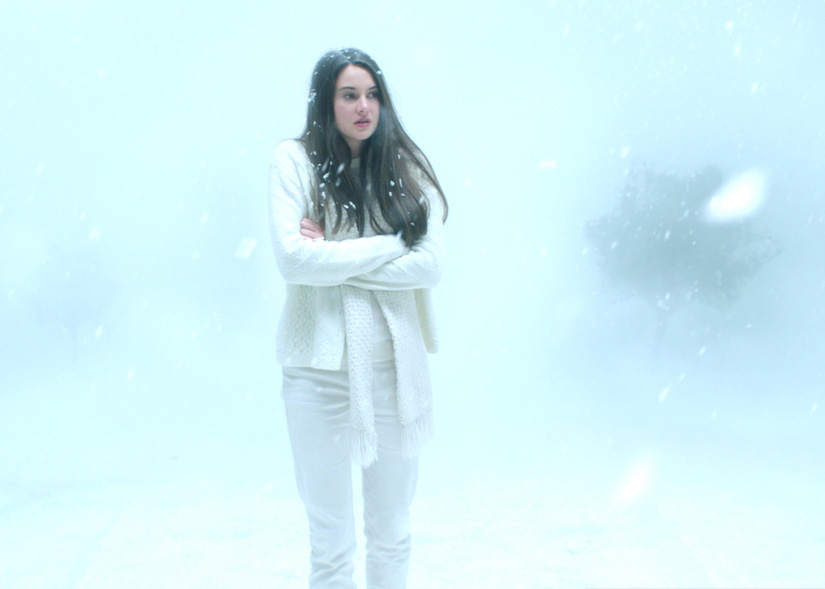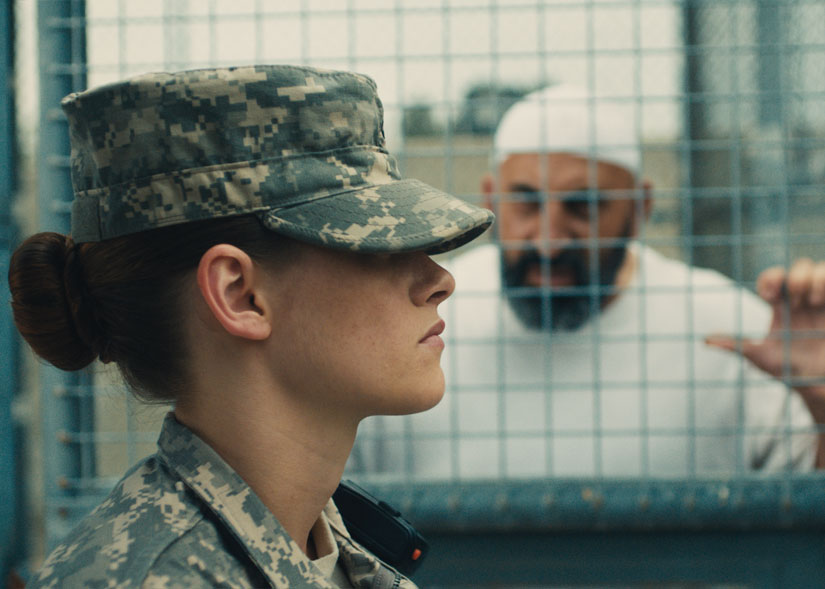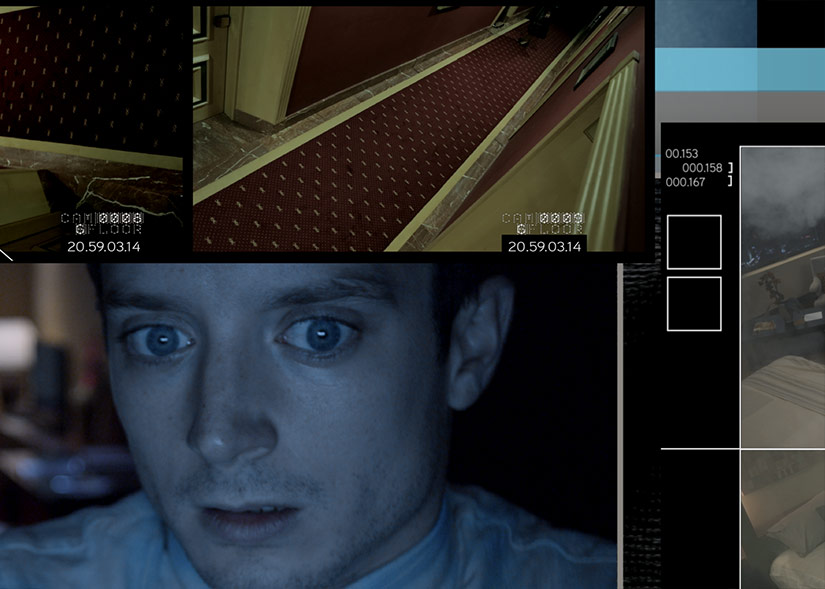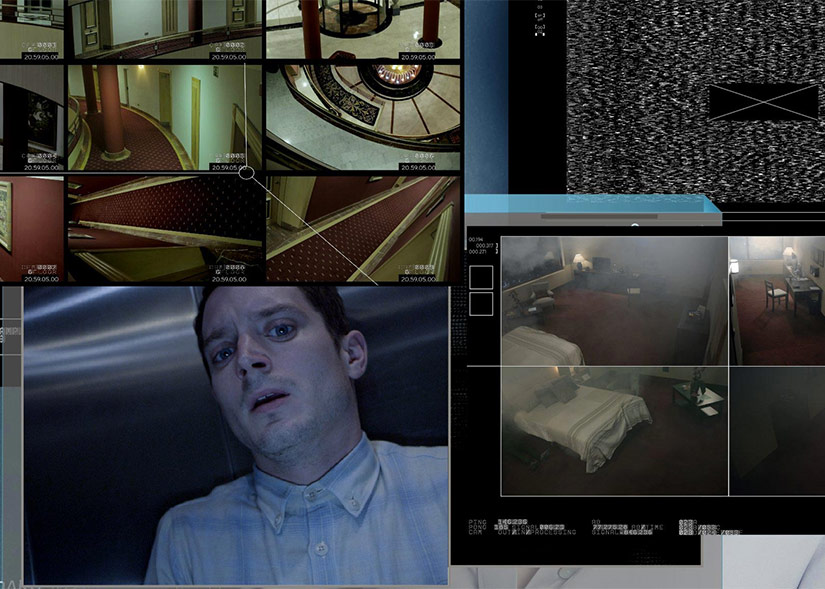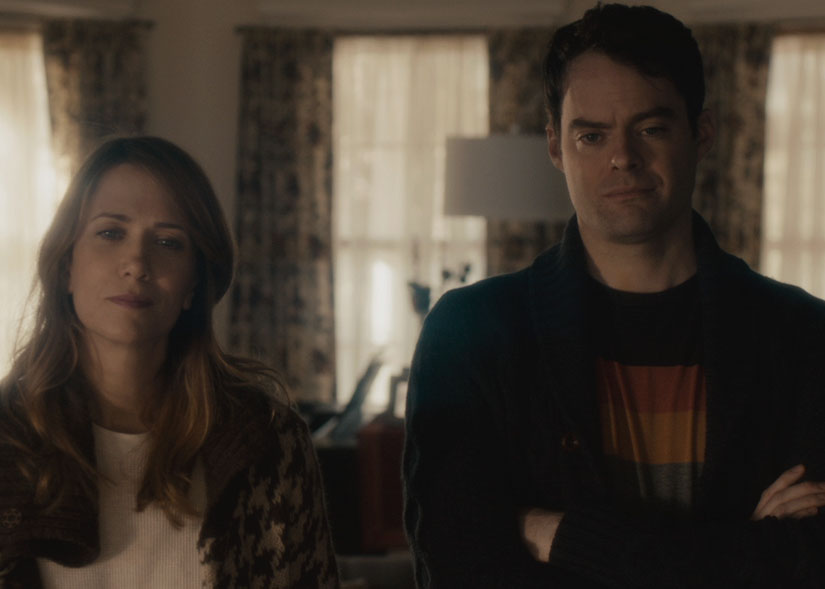[Review] Red Knot
There's the cliche metaphor of marriages being like journeys or adventures into the great unknown with another person whom we're lucky to have accompany us. The theme of the distant journey is one examined thoroughly in Scott Cohen's film, Red Knot. Shot on-location in Antarctica, the film is equal parts adventure, romance, and drama as it explores the fall of a newlywed's young marriage amidst the icy backdrop of the Antarctic landscape.
[vimeo id="110745005"]
Red Knot
Director: Scott Cohen
Rating: N/A
Release Date: December 5, 2014 (NYC)
Chloe (Olivia Thirlby) and Peter (Vincent Kartheiser) are a young newlywed couple embarking on an expedition to Antarctica for an assignment Peter is writing on one of the other passengers. While the journey begins peacefully, Chloe begins to feel isolated and ignored due to Peter's devotion to his work. The troubles come to a head when Chloe hears word that their psuedo-honeymoon might be extended into a year-long expedition, leading Chloe to get her own room and establishing independence from Peter onboard the ship.
Red Knot's thematic explorations is further expounded upon by the gorgeous cinematography of the Antarctic landscape. It's a bit cliche to draw the comparison of separation and marital displacement with the grandiose displacement of being placed in the Antarctic, but the photography in Red Knot is spectacular, with the cinematography shared between Igor Martinovic, Michael Simmonds, and Chris Webb. Antarctica is the type of landscape saved for documentary fodder, so seeing it play such a pivotal role in an independent drama film was breathtaking and helped enhance the film.
But I probably wouldn't have felt so strongly about Red Knot were it not for Thirlby's performance. Those familiar with my work know I'm a huge fan of her work, but it's not without reason: Every film Thirlby has starred in, she's stood out with brilliant performances, and Red Knot is no exception. Her character in Chloe struggles with being self-independent, but also supportive and thoughtful of her spouse's decisions. It's a hard line to straddle, especially in the rising exposure of pro-feminist ideas in media, art, and culture, but I felt that Thirlby handled the role deftly.
Red Knot is the type of film rife for literary examinations and analyses. There's much to be said of the film's themes (which I briefly touched upon with displacement, comparison of the film's setting and its relation to the marriage front and center of the film, etc.), and will invite avid cinephiles to revisit the film numerous times to fuel their literary fancies. Again, on its surface, Red Knot is a love story about a dwindling marriage, but there are many ways to examine and analyze the film through this basic theme that will appeal to those like me who love to read deeper into the films they watch.
Red Knot is a beautifully-shot film buoyed by an extraordinary performance from Thirlby. While the film's themes are a bit too cookie cutter, the cinematography and gorgeous shots of the Antarctic landscape make up for it. Cohen certainly has the ambition and vision to become an inspiring filmmaker, if Red Knot serves to be the first in a hopefully storied filmography.
[Review] Amor Cronico
Concert films rarely escape from the typical format of a minor documentary leading into and out of live show footage. With Amor Cronico, Jorge Perugorria's solo directorial debut, the aforementioned concert film format is shuffled up a bit, with the film following Grammy-nominated and Cuban-born singer CuCu Diamantes' tour across her home country mixed in with a fictional love story. Was it enough to break free from the trappings of the genre's conventions?
Amor Cronico
Director: Jorge Perugorria
Rating: N/A
Release Date: November 4, 2014 (Available here)
CuCu Diamantes finds herself in an awkward situation: She's too much Cuba for New York, but too New York for Cuba. During a country-wide tour of her home country, she meets a little person named Guarapo. They instantly connect to one another, and the singer decides to bring him on tour with her in an advisory/managerial-esque role. Throughout their journey, they fall into comedic episodes, such as their tour vehicles constantly breaking down and the like. The most prevalent arc through the fictional narrative is Guarapo's unrequited crush on CuCu, which is explored through various cutaway scenes. Sprinkled throughout the narrative are live performances of CuCu and her band.
As is the nature of concert films, Amor Cronico will only draw in pre-existing fans of the artist (in this instance, CuCu Diamantes). The added layer of the narrative was a nice touch to allow both CuCu and Perugorria to express their creativity and make Amor Cronico more than the typical concert film. However, while their intentions were sound, the film might have been better suited as a typical concert film. The plot did help beef the film up a bit, but was ultimately forgettable and uninteresting. The twist ending was a fun poke at the genre and filmmaking overall, but it would have been better appreciated if the metafictional, fourth-wall breaking was explored further throughout.
The narrative also distracted from the live performance scenes, which were absolutely amazing. I had personally never heard of CuCu prior to the film, but her voice and diva-like aura were captivating. I'd have much preferred to watch her perform than galavant around Cuba with her semi-fictional entourage. Then again, I guess that's what YouTube is for, right?
[Review] The ABCs of Death 2
The horror film genre is full of varying levels of quality from amateur films to Blockbuster genre films. As we all know, the best films come from the indie filmmakers not held back by studio demands. 2012's The ABCs of Death found 26 directors tackling the subject of death from any angle, so long as it corresponded to the letter of the alphabet in which they were assigned. And much like anthology films and similar film collections, many vignettes/segments are hit or miss.
Thus is the nature of anthology films, and with this year's sequel, The ABCs of Death 2 is a mixed-bag full of both interesting and exciting death shorts and uninspiring, bland shorts.
[vimeo id="104667241"]
The ABCs of Death 2
Directors: Various
Rating: R
Release Date: October 31, 2014
As addressed in the introduction, The ABCs of Death 2 features 26 shorts directed by different directors from across the world assigned to a letter of the alphabet. To an artist, the prompt must be a godsend to exhibit creative freedom over the depiction of death. For horror films, an anthology film like The ABCs of Death 2 allows them to experience new talent demonstrating their abilities in a short enough span so that, in case the short isn't to that viewer's liking, it'll end quickly before moving on to the next segment. In saying that, the balance isn't too terribly off, but there are definitely shorts that stand out way more than others.
Some of the aforementioned highlights include B is for Badger (directed by Julian Barratt) about a documentary team encountering wild badgers; D is for Deloused (directed by Robert Morgan) is a stop-motion short about a bug that helps kill an executed man's killers; F is for Falling (directed by Aharon Keshales and Navot Papushado) about an Israeli woman finding her parachute caught in a tree and encountering a militant Palestinian boy; I is for Invincible (directed by Erik Matti) about grown siblings attempting to kill their immortal mother for her inheritance; M is for Masticate (directed by Robert Boocheck) about a man going on a vicious, zombie-like murder spree down a street due to bath salts; O is for Ochlocracy (mob rule) (directed by Hajime Ohata) about a woman who survived a zombie outbreak, but faces charges for her rampant murders in light of a cure for the disease; S is for Split (directed by Juan Martinez Moreno) about a man on a business trip talking to his wife on the phone just as somebody breaks into her house; T is for Torture Porn (directed by Jen and Sylvia Soska) about a woman objectified and treated terribly at a porn shoot revealing her vagina's made up of tentacles; and Z is for Zygote (directed by Chris Nash) about a pregnant woman who has resisted giving birth to her child for 13 years.
The sum of The ABCs of Death 2 is made up of more hits than misses (the previously listed shorts are just my personal favorites), and makes for a good night at the theater or at home. Audiences will be able to discover new filmmakers they might not have known about before, and will get the chance to view different styles of the horror genre that would appease anybody along the spectrum. Hopefully, some of the shorts in the anthology can be expanded upon into feature-length films or as part of a series.
[Review] Birdman or (The Unexpected Virtue of Ignorance)
In my line of work, I hear of dozens of new films each week. On the one hand, it's great to have an insider, early look at a lot of the films coming out in the calendar year. On the other hand, it takes away from the intrigue and spectacle that films used to have before I decided to follow this career path. It's rare, but every once in awhile, a film will seemingly come out of nowhere and retrieve those lost feelings of awe and wonder. Birdman or (The Unexpected Virtue of Ignorance) was that film for me.
In saying that, I subconsciously set a high bar walking into my screening of the film. Considering the cast and crew (Babel and Amores Perros writer/director Alejandro Gonzalez Inarritu, Michael Keaton, Edward Norton, Emma Stone, et al), how could I not? After a year full of festivals and amazing film premieres, would Birdman be able to rise above all of them and surpass my exceedingly high expectations? Spoiler alert: Yes and no.
[youtube id="xIxMMv_LD5Q"]
Birdman or (The Unexpected Virtue of Ignorance)
Director: Alejandro González Iñárritu
Rating: R
Release Date: October 24, 2014
Riggan Thomson (Michael Keaton) found success in the '90s portraying the superhero Birdman in a blockbuster franchise that is still remembered fondly to this day. Feeling artistically empty and desperate to affirm his talent as not only an actor but as an artist, Thomson is writing, directing, and starring in a Broadway play based on Raymond Chandler's short story, "What We Talk About When We Talk About Love." After the lead actor is viciously injured by a fallen stage light, Riggan implores his producer, Jake (Zach Galifianakis), to get Mike Shiner (Edward Norton), the most talented current Broadway actor. However, after Mike joins the cast, tensions rise between he and Riggan as control over the play ultimately falls out of Riggan's hands.
Through this, Riggan must also contend with the contentious relationship with his daughter, Sam (Emma Stone), a recovering addict fresh out of rehab, his relationship with girlfriend and co-star Lesley (Naomi Watts), the strong friendship with his ex-wife and Sam's mother, Sylvia (Amy Ryan), and a New York Times critic and close friend of Mike's who promises to bury the play in her review due to her perceptions of Riggan as a Hollywood hack simply extending his 15 minutes of fame. Of course, there's also Riggan's growing pangs of a midlife crisis breakdown and the eponymous Birdman manifesting itself within Riggan's psyche.
There are so many elements playing both in concert and conflicting one another in Birdman that it'll take multiple viewings to dissect and analyze the full depth of the film. For the sake of this review, I'll focus on the biggest and most apparent elements: the difference between theater and cinema and Birdman's attempt to create a dichotomy of the two and the dissection of art/entertainment. Birdman is screened to seem like it was all one long take with no edits (there are edits made through deception, i.e. dark shadows in corridors, etc.). This visual element gives the audience the notion that you are watching one long sprawling play about a cast of characters putting together a Broadway play. The characters themselves (both actors and supporting characters) always give off this notion of acting, creating the illusion that the characters are always "on stage," with lines delivered much like soliloquies found more within theater than in films.
The combination of the two may disarm viewers expecting a traditional film, and the effect may not carry the same esteem for everybody. Others may not like how much of the dialogue is delivered as if every actor had a spotlight shining on them as they stood upon a soap box and recounted personal, emotional stories about their characters. But for myself, somebody who has dedicated a growing number of years to analyzing and critiquing films, I absolutely loved Inarritu and cinematographer Emmanuel Lubezki's approach to Birdman. I'm a sucker for film visionaries that aren't scared to experiment with their craft. What's more, I think they truly pulled off creating the idea of Birdman, the film, being representative of a film of a play presented as a play through film.
What's more, it's hard to ignore the metafictional crux of the film of Michael Keaton playing the lead role, given his memorable performances as Batman during the early '90s. Without his past, would a film like Birdman even exist to this level? Probably not. Keaton truly is the heart and soul of the film, and not only does he knock it out of the park, each and every supporting actor from Norton to Stone to Ryan to Galifianakis help ensure Birdman reaches the levels Inarritu intended when putting the film together. Hell, even the jazz-influenced drum score by Antonio Sanchez helped ratchet up the faux-appearance of tightly-written improvisation.
Birdman or (The Unexpected Virtue of Ignorance) was everything I wanted it to be and more. Even as I write this, I'm making plans to view it for a second time. As the awards season begins and many highly-regarded films will be released into theaters for Academy Award consideration, Birdman currently flies above the potential of any film scheduled for release through the end of the year. However, its experimental nature might not be for everyone, and while it may collect a multitude of critic awards and Top Ten list considerations, I'll be disappointed (but unsurprised) if it doesn't capture the amount of Oscar nominations it should. For the average weekend moviegoer, if you want to see some of the year's best cinematic performances and watch the vision of one of Hollywood's true visionaries, take it upon yourselves to find a theater that is screening Birdman or (The Unexpected Virtue of Ignorance).
[Review] White Bird in a Blizzard
This review was originally published as part of our Sundance Film Festival coverage. It is being re-posted to coincide with the film's theatrical release.
[youtube id="NMU1Hq3pQjM"]
White Bird in a Blizzard
Director: Gregg Araki
Rating: N/A
Release Date: January 20, 2014 (Sundance)
With a name like White Bird in a Blizzard, I couldn't help but find myself intrigued by the film. It didn't hurt that indie darling Shailene Woodley (The Spectacular Now) starred in the film, either. There's a simple connection drawn from the title to the film's premise, yet director Gregg Araki never lets White Bird in a Blizzard ever grow stale. Rather, what starts off tonally as a pseudo-romantic coming-of-age film quickly becomes a dark mystery thriller that had me pinned to the edge of my seat.
Set in the late 1980s, White Bird in a Blizzard is about Kat Connor's (Woodley) relationship with her alcoholic mother, Eve (Eva Green), and cowardly father, Brock (Christopher Meloni). As Kat matured into a young adult, her mother's intense jealousy grew as the distaste of her relationship and life began to take over her psyche in a scary midlife crisis. When Eve mysteriously vanishes, both Kat and Brock face an uncertain future. As the years pass, the disappearance is nothing more than a curiosity until Kat returns home during a holiday college break when new information arises that could complicate her relationships with everyone around her.
It's a bit hard to summarize White Bird in a Blizzard because of all of the plot twists and turns. As I implied in the introductory paragraph, White Bird in a Blizzard carries a certain connotation with it, yet the film is anything but straightforward. This is complemented by Woodley's performance, which is vastly different than anything she's done before. Araki is known for his use of sex and nudity (re: Mysterious Skin), and White Bird in a Blizzard is no difference. Woodley spends just as much time topless as she does clothed, and it came completely unexpected. However, it's all within tasteful reasons that actually serve the plot. Much like the aforementioned Mysterious Skin, there's a creepy, unassured tone underlying the entirety of the film that will keep you second-guessing everything and everyone, tempered by a foreboding notion that something bad is going to happen, and soon.
This sensation is perhaps most characterized by Green's stellar performance. You can't help but both sympathize with her and her unfortunate sense of marital and livelihood stagnation, yet you're frightened and creeped out by her episodic attacks on Kat. Meloni, too, demonstrates his range by playing the assuming Brock, running counter to the rest of his filmography. Hell, even Shiloh Fernandez (Evil Dead) puts in a solid performance as Kat's dimwitted ex-boyfriend.
White Bird in a Blizzard will keep you moving in your seat, whether it's due to arousal or discomfort... which is perhaps the best way to describe a Gregg Araki film. It may be hard to find an audience due to the sexual nature of the film, but if you get the chance to see it at another festival or an independent theater, I highly recommend checking it out.
[Review] Camp X-Ray
This review was originally published as part of our Sundance Film Festival 2014 coverage. It is being re-posted to coincide with the film's limited release.
Camp X-Ray
Director: Peter Sattler
Rating: N/A
Release Date: January 17, 2014 (Sundance)
Guantanamo Bay still serves as a dark footnote in American history more than a decade after its establishment. Everything about the detention camp, from its mistreatment of its "detainees" to the very reason for its existence, is inhumane and utterly sickening. Camp X-Ray is about one specific camp, the titular Camp X-Ray, which served as a temporary detention center in the Guantanamo Bay. Writer/director Peter Sattler's film attempts to humanize both guard and detainee alike.
Amy Cole (Kristen Stewart) is a recently-assigned rookie guard at Guantanamo Bay. While she's cordial and friendly with the other guards, it's with a Gitmo detainee, Ali (Peyman Moaadi), who Cole makes a real connection with. The relationship starts on a frosty tip, Cole the newcomer and Ali the years-long detainee. The dynamic of their friendship, as is made evident early on, revolves around this dichotomy between the two where their individual situations are more common than meets the eye.
Unfortunately, Camp X-Ray is bogged down by stereotypes, ranging from the power-hungry superior officer to the young, naive solder who inevitably falls in line. In a way, the shallow characterization of the supporting cast helps accentuate the focus on both Cole and Ali and their friendship. However, the emotional crux of the film relies on Stewart's performance, which oftentimes showed the potential and range she displayed in Into the Wild, yet is unable to tap into here. When it comes time for Cole to move past her hardened soldier demeanor and show true human emotion, Stewart falters. Whether it was Sattler's direction to keep Stewart reined in to maintain the aforementioned toughness, or simply Stewart's inability to let go, it was hard to look past this one low scene in a film otherwise full of high praise for the actress.
Camp X-Ray doesn't attempt to make much of a political statement, nor does it attempt to excuse the accusations of inhumane treatment that took place at Guantanamo Bay. What it does do, however, is explore a poignant, unlikely friendship between captor and captured, guard and detainee. Sattler, at times, holds audiences hands as he pontificates the similarities between Cole and Ali, which can be frustrating. However, strong performances by Moaadi and Stewart (the aforementioned scene notwithstanding) are enough to overlook the otherwise easy storytelling.
[Review] Open Windows
Now, more than ever, cyber security has become a very legitimate threat in which everybody is a target. While the majority of headlines involving hacking have involved big corporations and celebrities, it's oftentimes the everyman whose credit card information gets stolen. Hell, a lot of cyber threats involve leaking of personal information, such as addresses, social security numbers, even personal photos (as we're all mostly aware of thanks to last month's "The Fappening"). In whichever form it may take, cyber security is a huge deal that not too many people take as seriously as they should.
Nacho Vigalondo's Open Windows explores this notion of cyber security with a film that's equal parts suspense, sci-fi, and action, held together by an exciting technical approach in which the entire film is shown through various computer windows and screens (more on that later). Does Open Windows continue Vigalondo's creative vision that was shown in his previous films Los Cronoscrimenes and Extraterrestre, or are the windows not as open as audiences may desire?
[youtube id="_Qz7DDvTA-I"]
Open Windows
Director: Nacho Vigalondo
Rating: N/R
Release Date: October 2nd, 2014 (VOD); November 7th, 2014 (theatrical release)
Nick Chambers (Elijah Wood) is the webmaster and owner of a fan site dedicated to actress Jill Goddard (Sasha Grey) that finds himself the winner of a contest to have a dinner and exclusive interview with Jill. However, she abruptly cancels on Nick. Downtrodden over the development, a man identifying himself as Chord (Neil Maskell), Jill's campaign manager, sends Nick an application that allows him to see through Jill's cell phone and computer screen as a means to make up for the cancellation. However, what begins as a voyeuristic breach of privacy soon becomes the only way Nick can protect Jill from a psychotic madman.
If this sounds pretty straight-forward, trust me when I say I've done my best to summarize the basic premise of the film without risking spoilers that reveal the true nature of the film's narrative, which has as many twists and turns that you'd expect from Vigalondo. As somebody who writes online for a living, I truly understand how important online nature is and how connected we must be to our sources of information at all times. Especially as an entertainment writer, sometimes a lot of our time is spent knowing every little detail and news bit about various celebrities. In a way, Open Windows serves as a critique of this culture of celebrity obsession. However, while the narrative will keep viewers along a very entertaining ride that, admittedly, results in a cheap ending, it plays a backseat to the technical achievements on display.
As noted by Vigalondo in my interview with him, Open Windows was shot with a multitude of cameras running at all times. The end result allowed various camera angles to be shot around the actors at all times through a contextual webcam, front-facing iPhone camera, computer screen, video camera, etc. The approach is a vast evolution of the typical first-person point of view seen in found footage films. However, whereas those films' characters are self-aware of the camera as both a camera and representative of a person, Open Windows' "cameras" aren't just cameras within the context of the film, but the aforementioned assortment of devices through which we can access information and, through that, visibility of the characters.
I might delve deeper into this analytical viewpoint of Open Windows at a later date, but for the sake of this review, I'll keep it brief and to the point: While the narrative discusses cyber security, voyeurism, terrorism, lack of privacy, etc., it's through the film's means of production (i.e. the channels in which both we, the audience, are relayed the information, as well as how the characters within the film are relayed the same information through the same channels) that formally make the connection/attachment to the film's themes. Sure, a big Hollywood blockbuster can have the same script, but if it were displayed through traditional ways, whether it's the third-person omnipresent perspective 95% of films follow or the first-person limited perspective of found-footage films, it wouldn't be the same. Literally every single second of Open Windows is seen and shown through these various "windows," and it's with this vision (both literally and figuratively) that I must tip my hat to Vigalondo to not only having the idea to craft this story, but to also have a format in which to properly tell it.
Open Windows is sometimes jarring, a little confusing, wholly entertaining, and will keep audiences asking questions throughout the duration of its runtime, whether they're about the film's plot or about how various scenes were shot. It's not a puzzle in the way Los Cronoscrimenes was, but it definitely has layers to it that audiences will want to piece together. I've spoken and praised a lot over Vigalondo's role in the film, but that's not to discredit both Wood and Grey; in fact, Grey's performance in the film is the best one I've seen in her career thanks to the perfect pairing between her personal persona and her character's.
Watch Open Windows and geek out over the film's technical achievements with your cinephile friends. This film is concrete proof that Vigalondo is here to stay, and I for one can't wait to see what he can churn out over the rest of his film career.
[Review] The Skeleton Twins
This review was originally published as part of our Sundance Film Festival 2014 coverage. It is being re-posted to coincide with the film's limited theatrical release.
The Skeleton Twins
Director: Craig Johnson
Rating: N/A
Release Date: January 18, 2014 (Sundance); September 12, 2014 (limited)
No matter how close we may be with another person, the likelihood of drifting apart is much higher than simply maintaining the relationship. It's a bitter pill to swallow, but various factors weigh in that can either extend or deter a friendship. What's worse is when family members inevitably drift apart. Craig Johnson's The Skeleton Twins tells the story of two twins who reunite after a 10 year-long estrangement - of course, their reunion brings with it both love and heartache as the duo rediscover and rekindle the bond between them.
Following a failed suicide attempt, Milo (Bill Hader) moves from LA to New York to live with his twin sister, Maggie (Kristen Wiig) and her husband, (Luke Wilson). While the reunion is tepid at best, the twins slowly begin to warm up to one another much in the same way their relationship had been as young children. However, as their love for one another grows stronger, so too do the dark secrets they each hide, ultimately coming to a head and changing their respective lives forever.
Given the fact that the leads are SNL alumni (with a supporting cast of Wilson and Modern Family's Ty Burrell), it's easy to assume that The Skeleton Twins will be indicative of the work both Hader and Wiig are most known for. However, while the film has its fair share of genuine laughs, it's a dark film with large skeletons in the closet (no pun intended) finding their way out. The laughs won't overshadow the melodrama, which should be kept in consideration when watching the film. The drama is compelling, twisted, and is honestly more memorable than the jokes.
In saying that, it was great to see Wiig and Hader not only embrace their comedy, but also showcase their range. The Skeleton Twins can get heavy, but it's never pandering or too imposing to the audience. Can it be melodramatic? At times, sure, but Wiig and Hader handle it deftly. The Skeleton Twins may not necessarily represent the actors' abandonment of comedy for drama, but it certainly shows they're more than capable of handling more trying roles.

